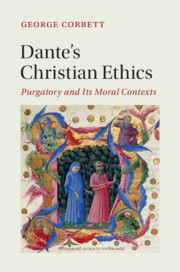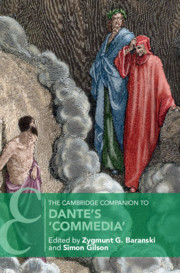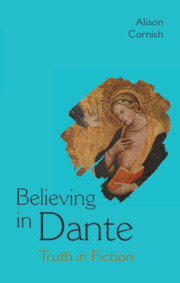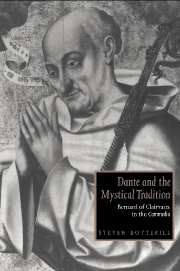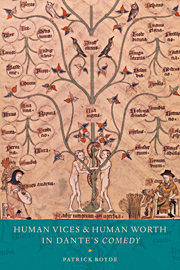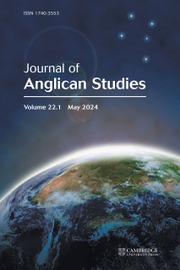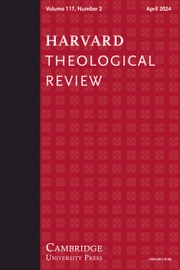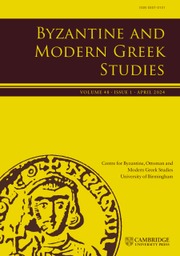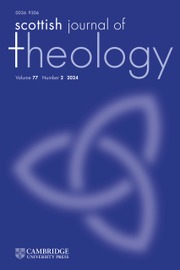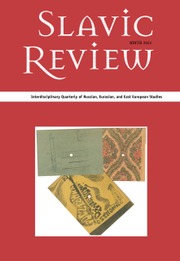Dante's Christian Ethics
Purgatory and Its Moral Contexts
$120.00 (C)
Part of Cambridge Studies in Medieval Literature
- Author: George Corbett, University of St Andrews, Scotland
- Date Published: April 2020
- availability: Available
- format: Hardback
- isbn: 9781108489416
$
120.00
(C)
Hardback
Other available formats:
Paperback, eBook
Looking for an examination copy?
If you are interested in the title for your course we can consider offering an examination copy. To register your interest please contact [email protected] providing details of the course you are teaching.
-
This book is a major re-appraisal of the Commedia as originally envisaged by Dante: as a work of ethics. Privileging the ethical, Corbett increases our appreciation of Dante's eschatological innovations and literary genius. Drawing upon a wider range of moral contexts than in previous studies, this book presents an overarching account of the complex ordering and political programme of Dante's afterlife. Balancing close readings with a lucid overview of Dante's Commedia as an ethical and political manifesto, Corbett cogently approaches the poem through its moral structure. The book provides detailed interpretations of three particularly significant vices - pride, sloth, and avarice - and the three terraces of Purgatory devoted to them. While scholars register Dante's explicit confession of pride, the volume uncovers Dante's implicit confession of sloth and prodigality (the opposing subvice of avarice) through Statius, his moral cypher.
Read more- Provides scholarly but accessible analysis of key areas of Dante's thought and poetry, including his ethics, politics, eschatology, conception of Purgatory, and moral autobiography
- Pioneers reading the poem 'horizontally' through its moral structure, correlative to experiments in 'vertical reading', with close readings of three terraces of Purgatory as narrative structural units and as moral regions
- Opens up new contexts - in preaching and penitential sources - for Dante's Christian ethics, including Peraldus' treatise on the vices, as a point of comparison with Aquinas' moral theology
Awards
- Winner, 2020 Choice Outstanding Academic Title
Reviews & endorsements
‘Dr George Corbett’s original, tightly argued, and in various ways surprising study [makes] a distinct contribution to the reappraisal of Dante’s theology, the re-examination of his intellectual formation, and the renewed investigation of the Commedia’s narrative structure. Corbett’s argument is buttressed by a close reading of Dante’s text combined with knowledge of the main influences on it and of the secondary literature.’ Robert Ombres, New Blackfriars
See more reviews‘Corbett’s work is a huge service to theologians, and indeed, interested readers, who wish to know more about Dante as a theological thinker - this book is the place to start … With the help of the texts and of the earliest commentators, Corbett opens up Dante’s world view for the contemporary theologian, locating the poet in the intellectual maelstrom of the late thirteenth and early fourteenth centuries’ Patricia Kelly, Pastoral Review
‘Dante’s Christian Ethics: Purgatory and Its Moral Contexts is an original and highly compelling piece of scholarship. George Corbett explores the Commedia as a work of ethics, [and] thus not only offers insightful readings of key themes and cruces, but enlarges our understanding of the very aim and premise of the poem as Dante presents them. Among the book’s many strengths is the way it opens up possibilities for future research. It would be fruitful to apply Corbett’s methodology - reading moral regions as formal structure units - to the Commedia as a whole, while Corbett shows, through example, the value of investigating the lived practices that shaped Dante’s worldview, practices familiar to Dante’s contemporary audience, but that we, as twenty-first-century readers, need to reconstruct in order to reach a deeper understanding of Dante’s poem.’ Helena Phillips-Robins, Italica
‘One of the remarkable points of Corbett’s argument is that he provides a new source for considering Dante’s Christian ethics in Purgatorio. By using Peraldus as a gloss Corbett opens up new readings of widely discussed episodes … One of the many strengths of this book relates to Dante’s intellectual formation … Corbett not only uses written documentation, he also looks to the visual, oral, and material cultures of Dante’s time for evidence.’ Elisabeth Trischler, Literature & Theology
‘George Corbett’s Dante’s Christian Ethics is a bold reappraisal of the intertextual foundations of the classifications and hermeneutics of vices and virtues in the second canticle of the Commedia. Corbett has identified a significant deficiency in the commentary tradition and makes efficiently economical use of relevant source materials to offer a compact, stimulating gloss of the moral rationale for Dante’s Purgatorio. While the primary focus of the volume is specifically Purgatorio, the author provides an overview of the moral structure of the entire poem, presenting his topics, arguments, and primary and supporting texts with invigorating efficiency throughout. Readers and researchers interested in the Commedia, be they students or seasoned scholars, will find this volume invaluable.’ C. S. Adoyo, Renaissance Quarterly
‘George Corbett’s excellent Dante’s Christian Ethics: Purgatory and Its Moral Contexts. One of the stated aims of the work is to offer a significant contribution to three of the wider currents in recent Dante scholarship, that is: the reappraisal of Dante’s theology, a renewed investigation of his forma mentis and a re-examination of the Commedia’s narrative structure. Corbett’s rigorous and genuinely innovative study delivers on all three counts.’ Daragh O’Connell, Annali d’italianistica
‘Indubbio merito del volume di Corbett eÌ quello di aver sviluppato, a margine di un discorso circa la natura morale della poesia del Purgatorio e circa la decisiva influenza esercitata in questo senso dalla Summa di Peraldo, un ampio e interessante discorso critico capace di lambire alcune delle strutture fondamentali della Commedia nel suo complesso, senz’altro meritevole di esser discusso. In ultima analisi, cioÌ che la prospettiva adottata da Corbett per rileggere il Purgatorio presuppone eÌ l’ampio e articolato tema del fine morale assegnato da Dante alla Commedia; appare, dunque, evidente come taluni snodi del discorso svolto in Dante’s Christian Ethics interessino alcuni aspetti fondamentali della vicenda intellettuale di Dante nel suo complesso.’ Nicolò Maldina, L’Alighieri
‘George Corbett examines Dante’s ethics and politics, appraising his magisterial synthesis of Aristotelian and Christian thought.’ Barbara Newman, LRB
‘The refreshing aim of this remembering of Dante’s Commedia is to remind the reader that the spiritual, moral, and ethical concerns of medieval literature were real and related directly to a robust, coherent Christian tradition available to readers in the day and to today’s readers.’ D. Pesta, Choice
‘The book guides the reader through a journey inside the Commedia and specifically the Purgatorio, gathering and commenting upon a large number of significant episodes of Dante’s journey. One of the work’s merits lies in further exploring the influence of Peraldus’ writings in Dante’s ethical thought and the architecture of the afterlife he describes. This book opens up several new directions of research, inviting us to read the rest of Purgatorio and Paradiso with a higher attention to the works of Peraldus, while shedding new light on the second cantica as a privileged place for Dante’s formulation of an ethical and political programme.’ Stefano Milonia, Medium Ævum
‘… a fresh and original reading of Danteʼs Commedia - with particular regard to the Purgatorio - focusing on and giving value to an ethical framework, which structurally underlies Danteʼs work … The monograph represents a valuable source for and contribution to the field of Dante studies …’ Kimberly Davis, Reading Religion
‘Corbett’s book, through a combination of a systematic analysis of the existing scholarship and a precise textual discussion of Dante’s Commedia and its sources, is a meaningful and comprehensive critical work that stresses the utter importance of both the ethical and political significance of Dante’s poem. Corbett’s monograph provides a fresh and original reading of Dante’s Commedia -with particular regard to the Purgatorio- [and] represents a valuable source for and contribution to the field of Dante studies, addressing and fulfilling the need to pay closer attention to the ethical dimension of Dante’s Commedia.’ Camilla Bambozzi, Reading Religion
‘Corbett’s book is well written, argued with careful and close textual attention, and finally it is persuasive. Indeed, the textual analysis does not merely engage with modern scholarship but gives equal attention to the commentary tradition as it situates Corbett’s close and original readings of Dante’s text. Corbett breaks new ground [making] a persuasive argument for the role of Peraldus’s ‘widely diffused and extremely influential treatise De vitiis’ that informs the moral theology of Dante’s Purgatorio. The close readings … were a startling revelation, enough to install Peraldus over Aquinas, as Corbett shows.’ Brenda Deen Schildgen, Speculum 97.3 (July 2022), 813-815
‘Writing with considerable verve and arguing his points with clarity and emphasis, Corbett shows us Dante as a medieval thinker and writer for whom creative literature fell under the heading of ethics, and as a believer intent on using his poetic eloquence and imagination to urge his audiences towards Christian salvation. [He] does so by offering a thorough reappraisal of Dante’s theology, paying especially close attention to the role played by contemporary preaching and penitential sources in shaping Dante’s practical sense of his poem’s function. This fine monograph offers significant intellectual rewards [and] it is a signal of the achievements of this study that Corbett leaves the reader wanting more.’ Catherine Keen, Italian Studies, DOI: 10.1080/00751634.2022.2127575
‘Corbett’s book is a great scholarly contribution. It adds much to our knowledge of the markedly ethical dimension underpinning Dante’s Commedia. Written in a very economical and clear style, Dante’s Christian Ethics provides a truly original and solid study of the ethical bearings of the Commedia.’ Tomasso De Robertis, Biblioteca Dantesca 5.30 (2022), 379-381
Customer reviews
Not yet reviewed
Be the first to review
Review was not posted due to profanity
×Product details
- Date Published: April 2020
- format: Hardback
- isbn: 9781108489416
- length: 246 pages
- dimensions: 235 x 160 x 18 mm
- weight: 0.48kg
- availability: Available
Table of Contents
Part I. Ethical and Political Manifesto:
1. Dante's ethical agenda: vital nourishment
2. Dante's political polemic: church and empire
Part II. Reframing Dante's Christian Ethics:
3. Dante's theological purgatory: earthly happiness and eternal beatitude
4. Two traditions of Christian ethics: Aquinas and Peraldus
Part III. Penance and Dante's Purgatory:
5. The terrace of pride, and the poet as preacher
6. The terrace of sloth, and the sin of scholars
7. The terrace of avarice, and love of children.
Sorry, this resource is locked
Please register or sign in to request access. If you are having problems accessing these resources please email [email protected]
Register Sign in» Proceed
You are now leaving the Cambridge University Press website. Your eBook purchase and download will be completed by our partner www.ebooks.com. Please see the permission section of the www.ebooks.com catalogue page for details of the print & copy limits on our eBooks.
Continue ×Are you sure you want to delete your account?
This cannot be undone.
Thank you for your feedback which will help us improve our service.
If you requested a response, we will make sure to get back to you shortly.
×
